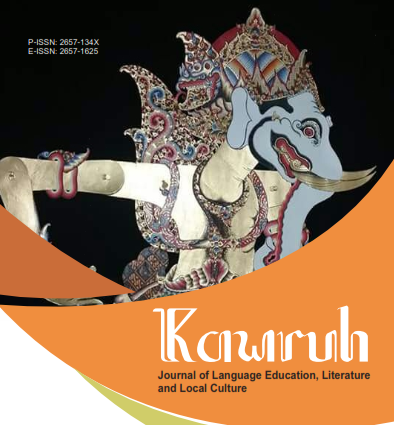Representasi Paribasan Manjing Ajur Ajer sebagai Sarana pendidikan Bagi Siswa SMA
DOI:
https://doi.org/10.32585/kawruh.v6i1.5182Abstract
This paper examines the representation of the proverbmanjing ajur ajer as used in a number of articles using the proverbmanjing ajur ajer. The aim is to explore the relevance of the values in the proverbs as a means of achieving educational goals. Using a qualitative approach themanjing ajur ajer proverbs selected from written and oral sources were studied. Although used in different contexts the use of these proverbs can largely be interpreted as character education values in positive attitude and behavior. It is also argued thatmanjing ajur ajer proverbs are represented positively, such representation is seen as a virtue. This research contributes practically to the achievement of students' affective competence.
Downloads
References
Browne, Ray B., and Alan Dundes. 1967. “The Study of Folklore.” The Journal of American Folklore 80 (317): 301. https://doi.org/10.2307/537878.
Dewi, Noviyanti Kartika. 2016. “Pengembangan Model Bimbingan Kelompok Berbasis Nilai Karakter Lokal Jawa Untuk Meningkatkan Kesadaran Diri (Self Awareness) Siswa.” Counsellia: Jurnal Bimbingan Dan Konseling 3 (1). https://doi.org/10.25273/counsellia.v3i1.231.
Hasdiana, Ulva. 2018. “Bergotong Royongmanjing ajur ajer Mengadaptasi Kebiasaan Baru.” Analytical Biochemistry 11 (1): 1–5.
Lomotey, Benedicta Adokarley, and Ildiko Csajbok-Twerefou. 2021. “A Pragmatic and Sociolinguistic Analysis of Proverbs across Languages and Cultures.” Journal of Pragmatics 182:86–91. https://doi.org/10.1016/j.pragma.2021.06.014.
Make, Meshesha, Abraham Kebede, and Fikre Alemayehu. 2014. “The Social Implications of Wolaita Proverbs: Functional Analysis.” International Journal of Languages and Literatures 4 (1): 225–46.
Mansyur, Firman Alamsyah, and Laode Achmad Suherman. 2020. “The Function of Proverbs as Educational Media: Anthropological Linguistics on Wolio Proverbs.” ELS Journal on Interdisciplinary Studies in Humanities 3 (2): 271–86. https://doi.org/10.34050/els-jish.v3i2.10505.
Sobari, Wawan. 2018. “Blater, from Affinity to Tyranny? The Phenomenon of Sole Candidate in the 2015 Local Election in Blitar Regency, Indonesia” 129 (Icsps 2017): 167–72. https://doi.org/10.2991/icsps-17.2018.35.
———. 2023. “Non-Religious and Ethnic Orientations in the Voting Process: A Recent Study of Javanese Voters.” International Journal of Asia-Pacific Studies 19 (2): 131–61. https://doi.org/10.21315/ijaps2023.19.2.6.
Subahri, Subahri. 2015. “Aktualisasi Akhlak Dalam Pendidikan.” Islamuna: Jurnal Studi Islam 2 (2): 167–82. https://doi.org/10.19105/islamuna.v2i2.660.
Suranto. 2018. “Evaluasi Program Revitalisasi Nilai-Nilai Kearifan Lokal Budaya Jawa Yang Relevan Dengan Etika Komunikasi Di Sekolah.” Widya Komunika 8 (1): 42–57.
Tamimy, Mohammad. 2019. “The Cultural Attitudes Towards Cooperative Learning: What Proverbs Can Offer.” Journal of Intercultural Communication Research 48 (4): 416–34. https://doi.org/10.1080/17475759.2019.1639536.
Downloads
Published
How to Cite
Issue
Section
License
Copyright (c) 2024 Agus Efendi, Tri Widiatmi, R. Adi Deswijaya, Bambang Ikhwanto

This work is licensed under a Creative Commons Attribution-ShareAlike 4.0 International License.
Authors who publish with the Kawruh: Journal of Language Education, Literature and Local Culture agree to the following terms:
- Authors retain copyright and grant the journal the right of first publication with the work simultaneously licensed under a Creative Commons Attribution License (CC BY-SA 4.0) that allows others to share the work with an acknowledgment of the work's authorship and initial publication in this journal.
- Authors are able to enter into separate, additional contractual arrangements for the non-exclusive distribution of the journal's published version of the work (e.g., post it to an institutional repository or publish it in a book), with an acknowledgment of its initial publication in this journal.
- Authors are permitted and encouraged to post their work online (e.g., in institutional repositories or on their website) prior to and during the submission process, as it can lead to productive exchanges, as well as earlier and greater citation of published work.

